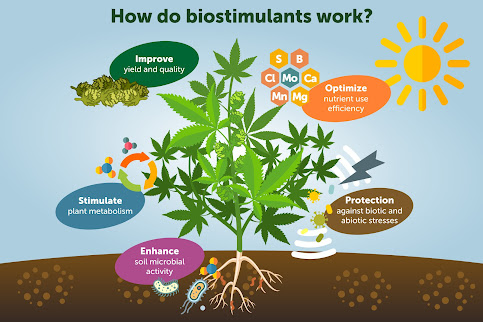Biostimulants Market: Paving the Way for Sustainable Agriculture
Biostimulants, in the simplest terms, are natural or organic substances that, when applied to plants or the surrounding soil, trigger physiological and biochemical processes. Unlike traditional fertilizers, biostimulants don't supply essential nutrients to plants directly. Instead, they act as enhancers, stimulating nutrient uptake, root development, and other beneficial plant functions. These substances are diverse and can include seaweed extracts, humic acids, fulvic acids, amino acids, plant hormones (e.g., cytokinins, auxins), and microbial substances (e.g., beneficial bacteria and fungi).
How Biostimulants Work:
The mode of action of biostimulants is multi-faceted. First and foremost, they improve soil health and structure, fostering a more favorable environment for plant growth. Enhanced soil structure allows better root penetration, leading to increased nutrient absorption and water uptake. Moreover, biostimulants can enhance microbial activity, promoting beneficial interactions between plants and microorganisms. These microorganisms can help fix atmospheric nitrogen, solubilize phosphorus, and protect plants from pathogens.
On a cellular level, biostimulants can positively influence various physiological processes. They can regulate gene expression, modulate enzymatic activity, and encourage hormonal balance within plants. As a result, plants become more resilient to abiotic stresses like drought, extreme temperatures, and salinity.
The Benefits of Biostimulants:
Sustainable Agriculture: Biostimulants play a significant role in the transition towards sustainable agriculture. By reducing the need for synthetic fertilizers and agrochemicals, they minimize environmental pollution and soil degradation, ultimately supporting long-term ecological balance.
Increased Crop Yield: Studies have shown that the application of biostimulants can lead to higher crop yields. Improved nutrient absorption, enhanced root growth, and stress tolerance contribute to increased productivity, benefiting farmers and food security.
Climate Change Resilience: As climate change brings about more extreme weather patterns, farmers face greater challenges in maintaining crop productivity. Biostimulants offer a promising solution by enabling crops to withstand adverse conditions, reducing yield losses caused by climate-related stresses.
Reduced Chemical Dependency: Biostimulants complement integrated pest management strategies, reducing the reliance on chemical pesticides. This creates a safer and healthier environment for farmers, consumers, and wildlife.
Improved Soil Health: Healthy soils are the foundation of sustainable agriculture. Biostimulants promote soil biodiversity, nutrient cycling, and organic matter content, leading to enhanced soil fertility and structure.
Conclusion:
Biostimulants represent an innovative and sustainable approach to modern agriculture, harnessing the power of nature to improve crop yields and strengthen resilience against environmental challenges. As the world faces mounting pressures to produce more food sustainably, biostimulants offer a valuable tool for farmers seeking to optimize their practices. By embracing these natural solutions, we can move towards a more resilient, ecologically balanced, and food-secure future. As research continues and technology advances, biostimulants will likely continue to evolve, unlocking even greater potential to revolutionize the agricultural landscape for the better.



.png)
Comments
Post a Comment